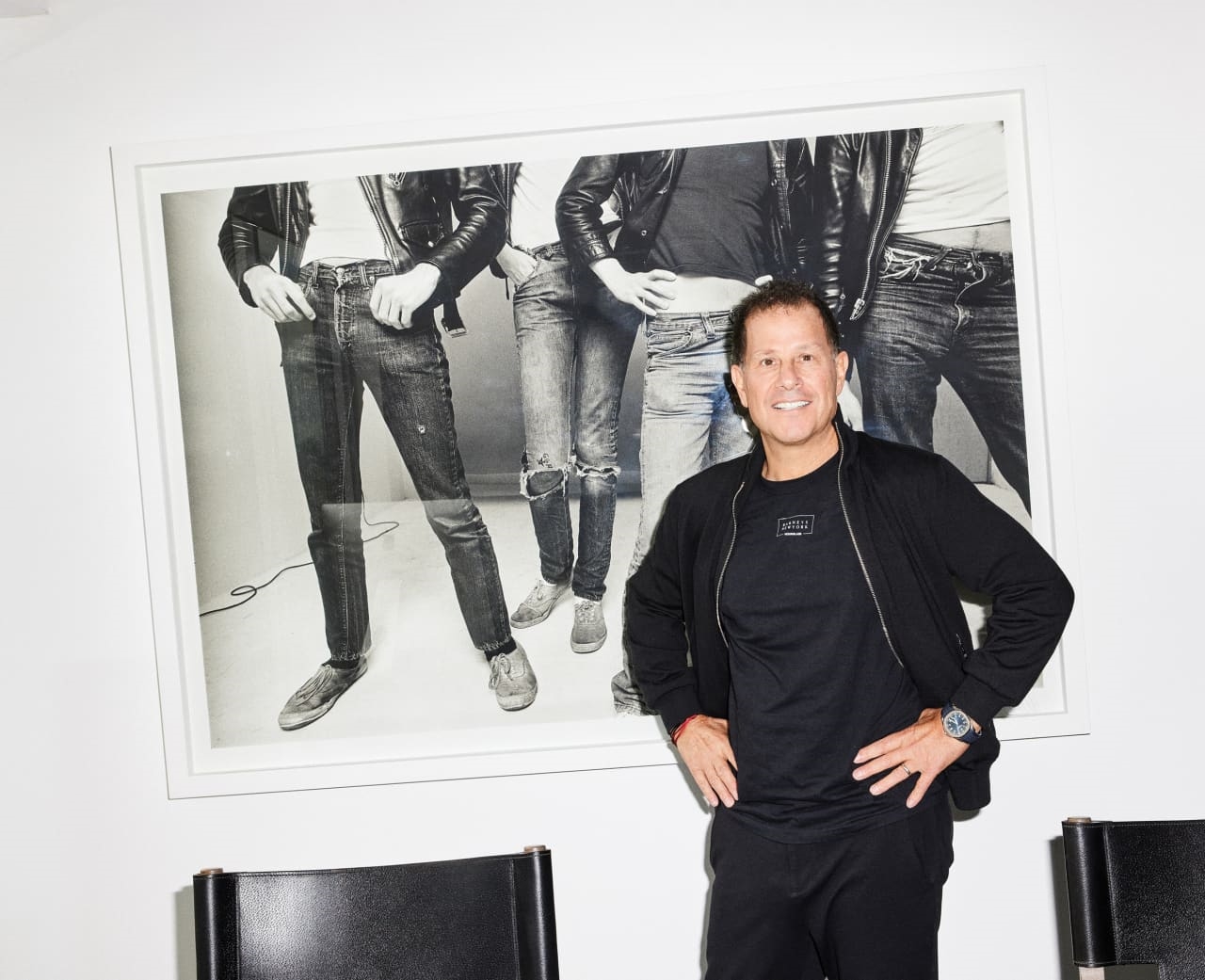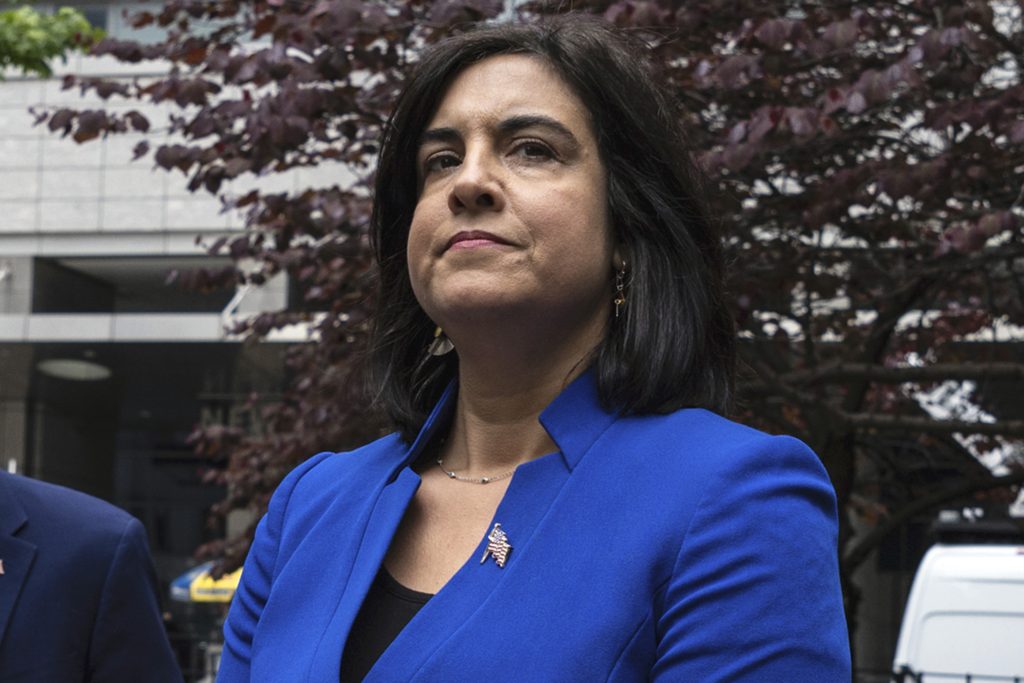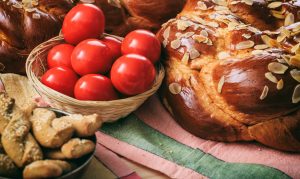TWO HOURS into what was supposed to be a one-hour conversation, Jamie Salter is ticking off a list of his 12 homes. He says he paid for them all in cash. There’s a house in Malibu and another in Miami. “I’ve got four in Canada. Four or five? I don’t even know,” says the 61-year-old chief executive of Authentic Brands Group, sitting at his desk in his Manhattan office, wearing a white button-down shirt, jeans and white leather Reeboks.
One of them is his “cottage” in Muskoka, a region in Ontario that Salter says is like the “Hamptons on steroids.” There are 12 buildings on 17 acres. “That’s the boathouse,” he says, pointing to images of the estate on Google Maps. “This is a party house. There are tennis courts, pickleball and padel courts right here. A golf course.” It’s where his family, including his wife of 38 years, Sheryl Salter, their four sons, who all work for the company, and their wives and children, spend the summer. At the property, which he calls Camp Salter, counselors entertain his six grandchildren and their friends.
This luxurious life is a world away from Salter’s middle-class upbringing in Toronto. A rare self-made billionaire, he’s built his fortune on fallen legacy brands.
Some, including Nine West, Aéropostale, Brooks Brothers and Barneys New York, had filed for bankruptcy before Salter scooped them up, confident he could squeeze out value. Authentic now owns more than 50 labels—enough to fill a shopping mall if anyone were still building them. Authentic also owns the intellectual property of late icons, including Marilyn Monroe and Elvis Presley, as well as living legends Shaquille O’Neal and David Beckham, whom Salter counts as close friends. He has elbowed his way into publishing, with Sports Illustrated , and Hollywood, by forming a production company. Authentic lent Presley’s IP to the Academy Award–nominated Elvis movie starring Austin Butler and developed the popular Beckham miniseries on Netflix.
Authentic doesn’t make any goods or operate retail stores. Instead, it licenses its brands to other companies for millions in royalties. Critics say Salter cheapens the brands he buys. He says he saves them from extinction.
Now he’s buying larger, more established names, including Reebok and Champion. For his next conquest, people familiar with the matter say he has his sights on Dockers, the khaki maker that Levi Strauss has put on the block. And he’s thinking about a public listing of Authentic’s stock. “We are getting too big to stay private,” Salter says.
Backed by Leonard Green, BlackRock and other deep-pocketed investors, Authentic last flirted with an IPO in 2021 but postponed the offering after snagging a big investment. At the time, the deal valued the company at $12.7 billion.
When asked how many more brands he could buy before the business becomes unmanageable, Salter says, “a lot.” The retail apocalypse of recent years has left traditional players licking their wounds. Those who might have once cringed at the idea of selling to a licensing company, fearing their labels would be degraded by a lack of quality control, now have few alternatives.
“When brands are ready to sell,” Salter says, “we generally get the first call.”
SALTER DOES NOT REGARD HIMSELF as a genius. He didn’t score well on aptitude tests as a kid, and he was in special-education classes in elementary school. But he’s always been a hustler.
When he was 17, he moved to Palm Springs, California, with his parents and two brothers. His father commuted from Los Angeles, where he was working as a record producer. While in high school, Salter got a job to earn pocket money as a valet at the swanky Palm Springs Biltmore. He says he parked cars for Dick Van Dyke and Frank Sinatra. “I was a little wheeler-dealer,” he says.
The record business was full of ups and downs, and when Salter graduated from high school, his father was on a downswing. “At that time, we didn’t have hit records or successful bands, so money was tight,” says his 84-year-old mother, Eitta Salter. Salter says his father told him he had to fend for himself financially. His older brother Mark paid his tuition at California State University in Long Beach.
Salter vowed to do better for his own family. “I’m never going to buy anything I can’t afford,” he says. “I’m never going to be that person who doesn’t pay my bills on time.” Hence all the houses and no mortgages. (His father, Gary Salter, died in 2017.)
In his early 20s, Salter moved back to Canada and transferred to Carleton University in Ottawa. He dropped out junior year and got a job in the warehouse of a company that made windsurfing boards, rising to sales manager. By 1987, he pooled $35,000 and bought a snowboard company. He sold it a few years later for $5 million.
Around this time, Salter met Michael Rubin, who would go on to build the Fanatics sports-merchandise empire. Both were selling factory overruns of sporting goods at the time, and they became friends.
On a trip they took to Las Vegas in the early 1990s, Rubin won $50,000 playing blackjack. Salter tried to get him to invest the winnings in a new company he was co-founding, Ride Snowboards. Rubin took the money back to the blackjack table and lost every cent.
When Ride went public in 1994, that $50,000 would have been worth $10 million.
“It taught me to always bet on Jamie Salter,” says Rubin. The following year, he founded a company that would become GSI Commerce, which ran the websites of retailers like Toys “R” Us, and tapped Salter to be its president.
The germ of Authentic started with an idea Salter had in 2006. What if he could buy the intellectual property of bankrupt brands and make them valuable again? Previously, companies that filed for Chapter 11 and had no hope of survival were eventually liquidated. Salter teamed with a large liquidation firm, Hilco Global, to form Hilco Consumer Capital. It snapped up Sharper Image, Polaroid and other fallen icons.
Salter was fired about three years later. He says he was terminated after making an offer to buy the division he was running. A Hilco spokesman says Salter never made a buyout offer and the firm parted ways with him over management-style differences.
When Salter formed Authentic in 2010, he created a list of companies he wanted to buy. Today, he says he owns most of the names on that list. Authentic is the second-largest brand licensor after Walt Disney, with an estimated $28 billion of its products sold at retail in 2024, according to industry magazine License Global . Licensees are required to pay Authentic a guaranteed minimum royalty of about 5 percent of estimated annual sales, even if actual sales fall short.
An early deal was the 2013 acquisition of Juicy Couture, famous for its terry-cloth tracksuits. Salter’s sons tried to talk him out of it, arguing that Juicy had lost its juice, according to his eldest, Corey Salter, who is now 35 and the company’s chief operating officer. Salter overruled them. That deal helped open markets in China, the Middle East, Europe and Latin America to Authentic’s other brands, Corey says.
When teen retailer Aéropostale filed for bankruptcy in 2016, Salter teamed with David Simon, the chief executive of mall giant Simon Property Group. The two hashed out an agreement to buy the chain on a Friday night, while Simon was driving to the Hamptons and Salter was getting ready to board a flight to Reykjavik for Corey’s bachelor party. (Instead of 3 a.m. shots at the bar, it was early wake-ups and glacier climbing. Corey says his dad is his best friend.)
The pair joined a consortium that included other landlords and liquidators and bid $243.3 million for the retailer. It was the beginning of a partnership that would see the formation of SPARC, or Simon Properties Authentic Retail Concepts, which runs several of Authentic’s retail holdings. “I wouldn’t have done the deal if Jamie wasn’t the guy,” Simon says. “He knows every aspect of this business.”
At 7-foot-1, Shaquille O’Neal towers over Salter’s 5-foot-5-and-½ frame. But as business partners, the two are well matched.
O’Neal helped put Reebok’s basketball shoes on the map in the early 1990s and had been urging Salter to buy the brand since 2015, when the former Los Angeles Lakers star inked a deal with Authentic to manage his name for merchandise and endorsements. As part of that deal, O’Neal became the second-largest individual Authentic shareholder behind Salter. “I saw that Reebok was slowly dying,” O’Neal says. He told Salter: “Brother, we need to get Reebok and get them back on track.”
For four years, Salter sent emails to former Adidas CEO Kasper Rorsted, telling him he wanted to buy Reebok, which the German company acquired in 2006. Then, in 2020, Salter got the call: Reebok was for sale.
Authentic’s bid was initially too low and he was out of the running. Salter upped it by $400 million to $2.5 billion. When the bankers wouldn’t return his calls, he sent an email directly to Adidas’s finance chief. His sweetened offer came out on top, and the deal closed in 2022. Reebok’s worldwide sales are up 40 percent since the acquisition, Authentic says.
Last year, O’Neal was named president of Reebok’s basketball division, a job he is doing for an annual salary of $1. He signed Angel Reese before she was drafted by the WNBA’s Chicago Sky, but said he doesn’t have the financial resources to get all the big names he’d like. “I looked at the budget and thought, How am I supposed to do something with this?” O’Neal says. Salter told him to figure it out.
The basketball star and the businessman were at the 2024 Super Bowl when O’Neal suggested they stop by Taylor Swift’s box to say hello. Swift was carrying a Judith Leiber football clutch with boyfriend Travis Kelce’s number on it, courtesy of Authentic, which owns the handbag maker. Salter wanted to stay, but O’Neal didn’t want to impose. “I know what it is to be a celebrity that has high demands, and I didn’t want to put that burden on her,” O’Neal says.
Salter disagreed. “We should have stayed longer,” he says. “We need to become friends with this girl. This girl can move mountains.”
In 2022, Authentic paid $269 million for a 55 percent stake in DB Ventures, which manages David Beckham’s brand and businesses, and the former soccer star became an Authentic shareholder. Since then, Beckham has done endorsement deals for Tempur mattresses; SharkNinja kitchen appliances; the online marketplace AliExpress; Hugo Boss; Nespresso; and Bowers & Wilkins headphones.
For a gold-star athlete, a few of those partners may seem a bit downmarket. But Beckham has a say over the companies he signs with and says one reason for teaming with Authentic was to get bigger. “I took my business to a certain level, but Jamie knows how to scale it,” he says.
In March, the two were snowboarding at Island Lake Lodge in British Columbia with Salter’s sons and Beckham’s son Cruz.
After hitting the slopes, the group played pool and ping pong while Beckham told stories about his days playing for the Real Madrid soccer club. The losers had to drink tequila shots. “Luckily, I didn’t lose that much,” Beckham says.
CRITICS SAY SALTER CHEAPENS the brands he buys by licensing them to companies that will pay Authentic the highest royalty fees, not those that make the best products. Oftentimes, the licensing partners then sell less expensive versions of the original products in retailers with the widest distribution, like Walmart or Macy’s. Salter says that his first priority is to find best-in-class partners and that any perception that he devalues brands is “not true.”
Shortly after Authentic acquired Brooks Brothers, the brand that dressed generations of white-shoe lawyers and bankers, not to mention several presidents, introduced a line of suits called B by Brooks Brothers. Sold at Macy’s, they retail for $640, about half the price of a traditional Brooks Brothers suit.
“I’ve never seen such shabbily made suits,” says Neil Saunders, who tracks the retail industry as a managing director of research firm GlobalData, who took photos of the garments and posted them on LinkedIn. Among his grievances: The sleeves were crumpled where they met the shoulder. “Brooks Brothers is supposed to be renowned for its tailoring,” Saunders says. “If you are not delivering on that, it diminishes the brand.”
An Authentic spokeswoman declined to comment on the sleeve issues. Salter says that B by Brooks Brothers will help the brand appeal to a younger generation.
As he’s moved into media, Salter has had his share of dustups.
Sports Illustrated, once a bastion of great writing, hit a low point last year when an investigation on the tech-news site Futurism accused its publisher, Arena Group, of publishing articles produced by artificial intelligence and attributing them to nonexistent authors. The investigation found that author portraits on several published stories matched photos on a website that sells AI-generated headshots.
Arena says the articles in question were licensed content from an external, third-party company, AdVon Commerce, which had assured it that all of the articles were written and edited by humans. Arena says it has since learned that AdVon had writers use a pen name in certain cases to protect author privacy, a policy it doesn’t condone. Arena says it has removed the content and ended its partnership with AdVon. AdVon says the content it licensed to Sports Illustrated was written by humans and believes the confusion arose because AdVon also provides AI-generated product descriptions to retailers.
Arena lost its publishing rights this year after Manoj Bhargava, the billionaire founder of 5-Hour Energy, took a controlling stake in the company and missed a $3.75 million quarterly licensing payment to Authentic. Bhargava then went “nuclear,” according to a lawsuit Authentic filed, laying off most of the magazine’s staff and posting “stolen” content on competing websites. Authentic is seeking $48.75 million in missed payments. Authentic’s lawsuit also accuses Bhargava of exploiting the magazine by pitching models from its swimsuit issue on selling his energy drink. Bhargava says Sports Illustrated wanted to become an advertising partner of 5-Hour Energy.
In a counterclaim, Arena accused Authentic of being a monopolistic and predatory company that squeezed Arena out of its role running Sports Illustrated through oppressive and illegal business tactics. It said Authentic’s accusations were unfounded and defamatory.
Bhargava says Authentic stacked the deck in such a way that Arena could never be profitable while it held the Sports Illustrated license. Arena says it had to make a choice between paying its employees or making the licensing payment. It chose its employees. The case is ongoing.
Duking it out in court isn’t the way Salter likes to do business. “As my mom says, ‘I’m a lover, not a fighter.’ ” But “when people screw us,” he says, “we have to protect our intellectual property.”
Salter is preparing his four sons to take over the company. He’s long sought their input on potential acquisitions. “That has helped him stay relevant and understand where young people are spending money,” Corey says.
Corey says his dad is always doling out lessons: Organization is valuable (his sons have been making daily to-do lists since they were kids), and in business being personable is more important than being the smartest in the room.
In the summer, the clan gathers at Camp Salter. The kids water-ski, take tennis lessons and ride around on scooters, while the grown-ups play pickleball or golf on his private course.
Salter says he’s a terrible golfer. His handicap is around 30. “If business were golf,” he says, “my handicap would be very low.”



